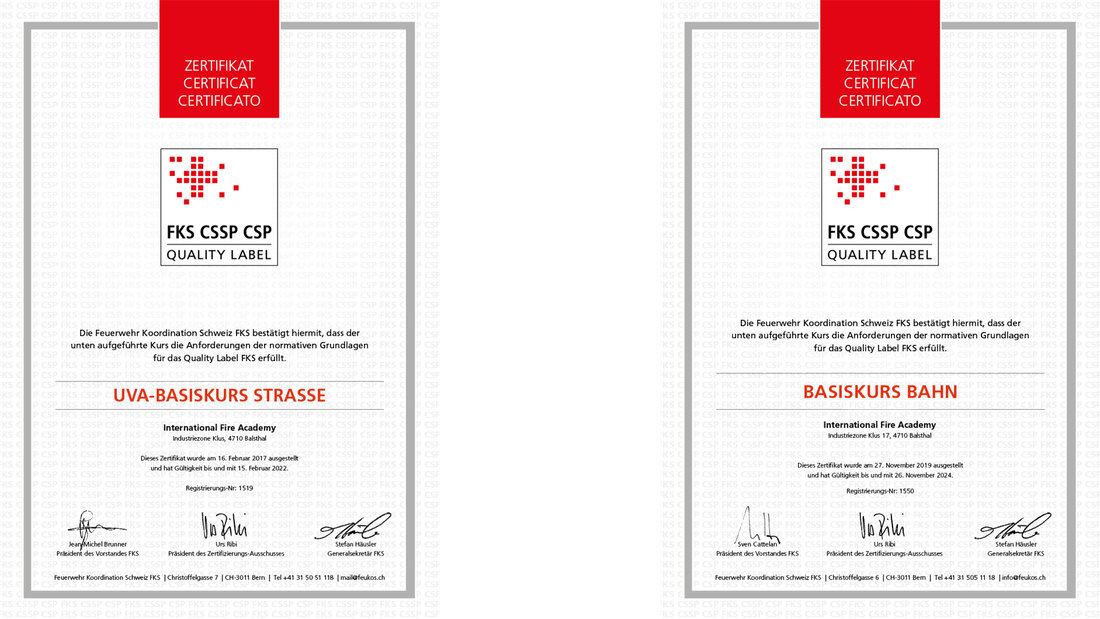The harmonisation and quality assurance of fire service training is one of the central tasks of the Fire Service Coordination Switzerland (FSCS). For this purpose, it relies, among other things, on the voluntary certification of training offers with the FSCS Quality Label. By the beginning of 2021, 27 courses throughout Switzerland had received this quality certificate. Among the applicants, the International Fire Academy is at the forefront with four courses.
The test scheme highlights the quality standard
In order to receive the FSCS Quality Label, a two-stage test procedure must be passed. The preliminary assessment evaluates the relevance of a course to the fire service. Petra Prévôt, Deputy Secretary-General of the FSCS, explains what is meant: «It is checked whether the course contents really have an impact on practical operations.» According to the FSCS criteria catalogue, the courses are intended to «increase the effectiveness of the fire services during operations». Only if the assessment is positive does the certification process continue.

Train, what is needed in operational practice
The topic of relevance will be considered in more detail in the second stage. The educational needs must be identified and meet the training requirements of the participating fire services. Another crucial point is the implementation of Swiss requirements and in particular the FSCS regulations.
When evaluating the framework conditions for the course, among other things, the learning environment, the technical equipment, the possibilities for the practical implementation of the educational content and, above all, safety are essential. Here, the International Fire Academy is particularly convincing with its training tunnel facilities. In addition to the definition of learning objectives, the content is of central importance: The course must convey practical and operational content based on current knowledge and comply with the regulations, teaching aids and regulations recognised by the FSCS. For the railway and road courses, this also includes the Tunnel Firefighting Procedures recognised by the FSCS as a training basis developed at the International Fire Academy.
The quality of the teaching is assessed by examining not only the methodology and didactics but also the skills of the trainers. Finally, the auditor pays attention to an appropriate evaluation regarding the learning success and quality assurance and the course development.
Growing awareness for the quality of courses
Petra Prévét is convinced that the certifications also positively impacts other training and further education for fire services. According to her observation, awareness of the quality of the courses is increased. She sees the most significant benefit of the FSCS Quality Label in that «the provider of a certified course shows that their course meets the standards and thus fulfils high-quality requirements not only in their own canton but on a nationwide level.» She also emphasises that the auditors are very experienced trainers from different cantons, recruited and subsequently trained in a multi-stage selection process. «Their experience from working as an instructor and auditor also gives the course provider professional/methodological added value and an interesting exchange.»
Operational procedure and courses recognised by the FSCS
The International Fire Academy was one of the first organisations to take advantage of the FSCS's offer and therefore had them certify a firefighters course. Already in November 2016, the Road Tactics Course received the FSCS Quality Label, followed by the Road Basic Course in February 2017. The Rail Basic Course was successfully certified in November 2019, the Rail Tactics Course in December 2020.
The Swiss Fire Service Inspector Conference, a panel of the FSCS, had already recognised the «Road Tunnel Firefighting Procedure» in 2012 and the «Railway Tunnel Firefighting Procedure» in 2018. This means that both of the two tunnel firefighting procedures and their training implementations are now officially recognised by the FSCS.
The procedures as mentioned above are documented in the two textbooks «Firefighting Operations in Road Tunnels» (available in German, English and French) and «Firefighting Operations in Railway Tunnels» (available in German; English and French are in preparation).








